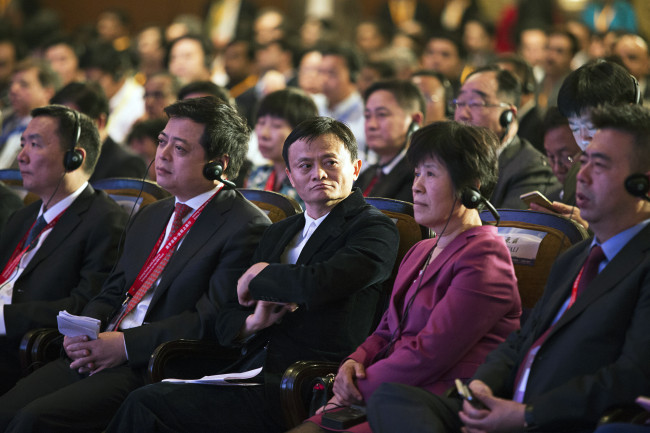NEW DELHI (AFP) ― E-commerce giant Alibaba’s founder Jack Ma promised Wednesday to invest more in India where online sales are soaring, predicting that the Internet will transform the country’s future.
Ma, on a whirlwind 48-hour trip with a nearly 100-member Chinese business delegation to India, has been scouting for investment opportunities to drive Alibaba’s revenues following its record $25-billion initial public offer in September.
“We’ll invest more in India, work with Indian entrepreneurs, India technology companies,” the billionaire told a New Delhi business audience on his first visit to India since the IPO.
Ma, who founded China’s biggest e-commerce company 15 years ago in his apartment with $60,000 collected from friends, divulged no figures for his Indian investment plans.
 |
Billionaire Jack Ma (center), chairman of Alibaba Group Holding, attends the India-China Business Cooperation Conference in New Delhi on Wednesday. (Bloomberg) |
India’s e-commerce sales totaled $2 billion last year ― a puny sum compared with China’s $300 billion.
But Indian sales are expected to hit around $15 billion by 2016, according to analysts, thanks to an increasingly affluent middle class, rising Internet penetration and growing smartphone use.
Ma, regarded as an Internet visionary, hailed India’s new tech-savvy Prime Minister Narendra Modi’s commitment to making India a fully-connected business destination. “As a businessman, I was inspired and moved,” he said.
“I was a teacher earlier and the Internet changed my life and I absolutely agree India can be changed by the Internet too.”
The 50-year-old executive chairman of Hangzhou-based Alibaba said India’s burgeoning youth population would fuel the Internet’s growth, adding: “The Internet is a business of young people.”
There is huge scope for technological cooperation between India and China, and “a great opportunity for entrepreneurs” from the sometimes fractious neighbors, Ma said.
Speaking about broader strategy, Ma said of his company: “Over the next three years, one of the key strategies for Alibaba is to globalize ... help more small businesses around the globe, use our services to do businesses.”
But he’s treading carefully, warning in the wake of Alibaba’s successful
IPO: “People think we are too good ― we can do anything. This is the most dangerous moment.”
Ma’s spokeswoman said he would participate “in a number of meetings with local businesses” in India, declining to give details.
Alibaba already has a small Indian market presence with a business-to-business sales start-up launched in 2010, while Indian merchants are the second biggest sellers on Alibaba after the Chinese.
Analysts expect Alibaba to expand in India’s e-commerce market, possibly teaming up with Snapdeal, which bills itself as India’s version of Alibaba.
Both Snapdeal and Alibaba allow online retailers to list wares from cooking oil to shoes and televisions.
Japan’s SoftBank, Alibaba’s largest shareholder with a one-third stake, last month became the biggest single investor in Snapdeal.
SoftBank pumped $627 million into Snapdeal, which has enjoyed explosive growth ― rising in just four years to become India’s biggest e-commerce marketplace with 25 million users.








![[Today’s K-pop] Blackpink’s Jennie, Lisa invited to Coachella as solo acts](http://res.heraldm.com/phpwas/restmb_idxmake.php?idx=644&simg=/content/image/2024/11/21/20241121050099_0.jpg)